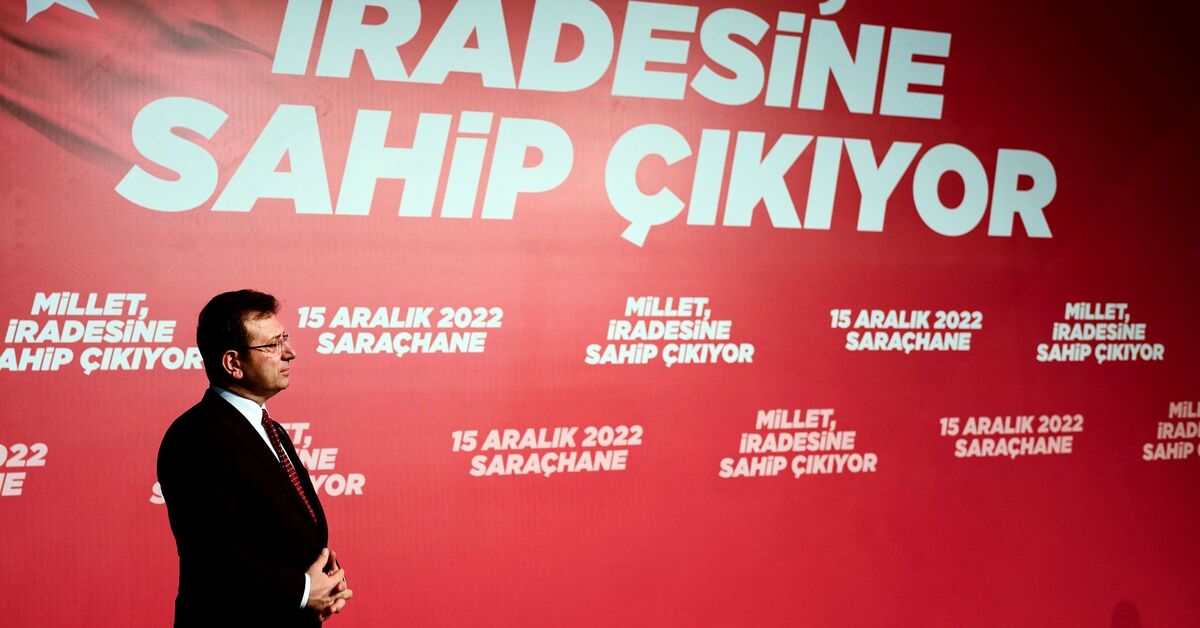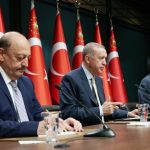Turkey’s media watchdog slapped two television channels with fines and broadcast bans following their coverage of a prison sentence and political ban on Istanbul mayor Ekrem Imamoglu.
The Radio and Television Supreme Council, or RTUK, fined Tele1 after its two leading commentators, editor-in-chief Merdan Yanardag and Prof. Emre Kongar, depicted the verdict against Imamoglu as “a coup against the will of the people” who elected the mayor in 2019.
Imamoglu, a possible rival to President Recep Tayyip Erdogan in next year’s presidential elections, was sentenced last week to more than two years in prison and banned from politics for “insulting” public officials. Recent polls say that many Turks, including supporters of the ruling party, find the decision unfair and politically motivated.
RTUK also fined HalkTV when two commentators reported that the opposition called Interior Affairs Minister Suleyman Soylu the “criminal affairs minister.” “Interior” and “criminal” rhyme in Turkish.
“RTUK has become a major obstacle to the freedom of press and expression,” said Yanardag in response to the financial penalty which according to him corresponds to some 6% of his chain’s monthly ad revenues.
Criticizing the decision for violating freedom of expression and “making up crimes that do not exist,” Yanardag said that in the eyes of the media watchdog, it had become a crime not to think the same way the government does.
HalkTV’s morning program hosted by veteran journalist Aysenur Arslan was also fined for “praising terrorism through facial gestures,” said Ilhan Tasci, an RTUK member nominated by the opposition Republican People’s Party (CHP).
Arslan, a septuagenarian who hosts the popular “Media Quarter,” mocked the decision to ban her for three days. “It seems that I made facial gestures praising terrorism and RTUK caught me at it,” she tweeted. “I am currently practicing more facial gestures in front of the mirror so I can make one for RTUK.” Then, on a more sober tone, she called on media groups and opposition politicians to speak up against what she called “made-up” charges.
A third fine was given to Fox TV, where Sera Kadigil, the outspoken Istanbul deputy of the Turkey’s Labor Party said, “Had Erdogan ever set feet in a market, he’d be ashamed of all his remarks on the economy.”
RTUK has often been accused of sinking independent or critical news channels under heavy fines and penalties. The fines are based on the channels’ income from advertisements, with each fine slashing three to five percent of the previous month’s revenues. The three separate fines on Arslan will cost HalkTV 9% of its November ad revenues.
RTUK’s decisions have been controversial for years, but as Turkey faces elections in the first half of 2023, the state-run body has tightened its grip on media outlets critical of the government. The Annual Media Monitoring Report 2021, prepared by the Ankara-based Journalists’ Association said that in 2021, 80 of the board’s 103 fines and penalties went to channels critical of the government. Five channels (Halk TV, Tele 1, KRT, Fox TV and Haberturk) paid a total of 23 million Turkish liras ($1.2 million).
Okan Konuralp, another RTUK member nominated by CHP, said that with the latest round of fines, the penalties on independent channels alone had reached 15 million Turkish liras ($803,500) so far in 2022.
In February, RTUK told the Turkish-language services of the Voice of America, Germany’s Deutsche Welle and Euronews to obtain a formal license or have their content blocked. Access to Deutsche Welle and Voice of America was banned in July, after the outlets refused orders to obtain licenses.
Nacho Sánchez Amor, the European Parliament rapporteur for Turkey, expressed concern about a new media law to “combat disinformation,” which increases the government’s grip on social media, and the trial of Imamoglu, whom he called a “political hostage.”
“I would like to reiterate my appreciation for Turkiye’s role as a mediator between Ukraine and Russia and in brokering the Black Sea Grain Initiative,” said the Spanish social democrat, who visited Ankara and Istanbul this week. But he also criticized the EU candidate country’s democratic progress. “For now, I regret to observe that in the case of Turkey, we can only speak of lack of progress,” he said. “The model that the Turkish government is offering today is, characterized by authoritarian rule and an absence of checks and balances.”
Source:Al-Monitor



